Fifth UN peacekeeper wounded in southern Lebanon, says Unifil (original) (raw)
What's been happening?published at 15:40 British Summer Time 12 October 2024
We will shortly be pausing our live coverage. Here is some of what's happened today:
- A fifth UN peacekeeper has been wounded in Naquora, southern Lebanon, after being hit by gunfire, the UN Interim Force in Lebanon (Unifil) says
- "He underwent surgery at our Naqoura hospital to remove the bullet and is currently stable," it says, adding that the origin of the fire is not yet known
- Elsewhere in Lebanon, four people have been killed in an Israeli attack on the southern town of Barja, according to the country's health ministry
- Meanwhile, the Israel Defense Forces (IDF) says dozens more launches have crossed from Lebanon into Israel today - with a number of them intercepted
- In Gaza, around 20 people were killed by an Israeli strike in Jabalia on Friday night, according to the Reuters news agency, citing medics
- The IDF has issued further evacuation orders in northern Gaza, in the "D5" area in Gaza City
The news desk will continue to monitor developments. Israeli attack on northern Gaza hints at retired general's "surrender or starve" plan for warpublished at 15:38 British Summer Time 12 October 2024
 Jeremy Bowen
Jeremy Bowen
International Editor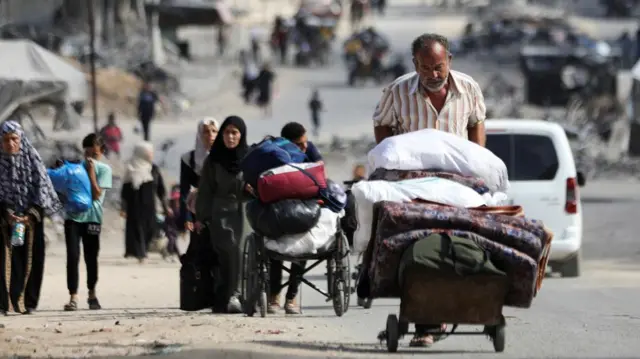 Image source, Reuters
Image source, Reuters
On Saturday morning, a message was posted on social media by the Israeli military’s Arabic spokesman warning people living in the ‘D5’ area of northern Gaza to move south. D5 is a square on the grid superimposed over maps of Gaza by the Israel Defense Forces (IDF). It is a block that is split into several dozen smaller areas.
The message, the latest in a series, said: "The IDF is operating with great force against the terrorist organisations and will continue to do so for a long time. The designated area, including the shelters located there, is considered a dangerous combat zone. The area must be evacuated immediately via Salah al-Din Road to the humanitarian area."
A map is attached with a large yellow arrow pointing from block D5 down to the south of Gaza. Salah al-Din Road is the main north-south route. The message is not promising a swift return to the places people have been living in, an area that has been pulverised by a year of repeated Israeli attacks. The heart of the message is that the IDF will be using "great force… for a long time". In other words, don’t expect to come back any time soon.
The humanitarian area designated by Israel in the message is al-Mawasi, previously an agricultural area on the coast near Rafah. It is overcrowded and no safer than many other parts of Gaza. BBC Verify has tracked at least 18 airstrikes on the area.
- You can read more from Jeremy Bowen's report here
IDF says dozens more launches cross from Lebanon into Israelpublished at 15:32 British Summer Time 12 October 2024
The Israel Defense Forces (IDF) says dozens more launches have crossed from Lebanon into Israel.
In one post on X, external, the IDF says 15 launches crossed into Israel from Lebanon.
And in an earlier post on X, external, the IDF said around 35 launches crossed into Israel from Lebanon.
The military says a number of these were intercepted.
And in the last few minutes, external, the IDF says two missiles crossed from northern Gaza into Israel - falling in an open area with no casualties.
Five peacekeepers injured in southern Lebanon this weekpublished at 15:24 British Summer Time 12 October 2024
As we've been reporting, a fifth UN peacekeeper has been injured after being hit by gunfire in southern Lebanon, according to the UN Interim Force in Lebanon (Unifil).
The peacekeeping mission says the origin of the fire is not yet known.
It follows two incidents in 48 hours, in which four UN peacekeepers were injured.
On Friday, the Israel Defense Forces (IDF) said its troops were responsible for an incident in which two Sri Lankan soldiers for Unifil were wounded.
At the time, the IDF said soldiers operating around the Unifil base in Naqoura identified a threat and opened fire, adding the incident would be investigated "at the highest levels".
On Thursday, two Indonesian Unifil soldiers were injured falling from an observation tower after an Israeli tank fired towards it.
Four people killed in attack on Barja, says Lebanese health ministrypublished at 15:02 British Summer Time 12 October 2024
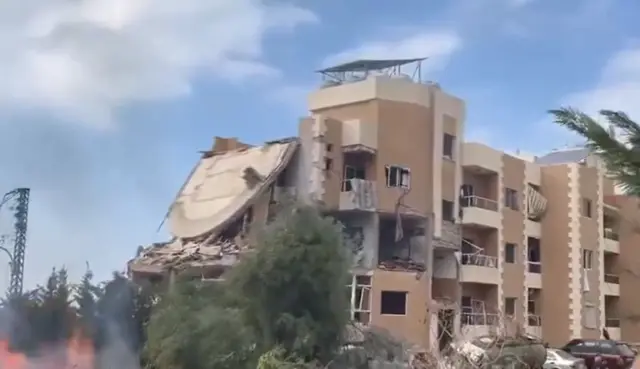 Image source, Social media
Image source, Social media
By Paul Brown
In the last few hours, several clips and photographs have appeared online showing severe damage to a building in the Lebanese town of Barja.
The Lebanese health ministry has reported that four people were killed and 14 injured, external in an "Israeli enemy raid" in Barja today.
The footage, which has been analysed by BBC Verify, shows a south-facing building with a rounded roof edge which has largely collapsed into the floors below.
Parts of the front and eastern side of the building have been completely blown out on the 1st or 2nd floor, suggesting that this was the point of impact.
Fires are also seen on the ground below.
The distinctive roof shape and other details in the surroundings allowed BBC Verify to match the location of the building to satellite imagery of the town.
Footage has also circulated showing at least three bodies in shrouds with emergency services in attendance. BBC Verify is working to establish the veracity of that clip.
Fifth peacekeeper wounded in southern Lebanon, says Unifilpublished at 14:54 British Summer Time 12 October 2024
Breaking
A fifth UN peacekeeper has been wounded in southern Lebanon after being hit by gunfire, the UN Interim Force in Lebanon (Unifil) says.
In a new statement, Unifil says a peacekeeper at its headquarters in the southern city of Naquora was injured on Friday night amid "ongoing military activity nearby".
"He underwent surgery at our Naqoura hospital to remove the bullet and is currently stable," it says.
"We do not yet know the origin of the fire."
Separately, Unifil adds that buildings at a UN position in the village of Ramyah sustained "significant damage due to explosions from nearby shelling" on Friday night.
"We remind all actors of their obligations to ensure the safety and security of UN personnel and premises, including avoiding combat activities near Unifil positions," it says.
Lebanese ambassador describes 'pattern of behaviour' in Israeli attacks on Unifilpublished at 14:06 British Summer Time 12 October 2024
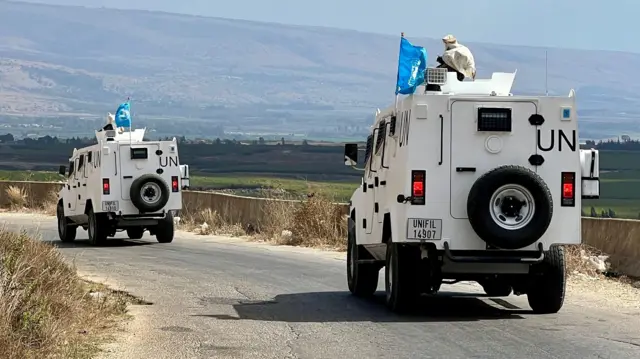 Image source, EPA
Image source, EPA
Yesterday, US President Joe Biden said he was "absolutely, positively" urging Israel to stop firing at UN peacekeepers during its conflict with Hezbollah in Lebanon, following two incidents in 48 hours.
On Friday, the Israel Defense Forces (IDF) said its troops were responsible for an incident in which two Sri Lankan soldiers for the UN Interim Force in Lebanon (Unifil) were injured.
On Thursday, two Indonesian peacekeepers were injured falling from an observation tower after an Israeli tank fired towards it.
Now, Rami Mortada, Lebanon's ambassador to the UK, describes Unifil forces to BBC Radio 4's Today programme as the "backbone" of any post-war arrangement.
He is pressed on his stating as fact that Israel is deliberately targeting UN peacekeepers, but goes on to say it's "clear this is a pattern of behaviour".
He also says the recent incidents raise questions about Israel's aims.
Asked about Hezbollah's activity in the region, he says Israel had never fully withdrawn either.
"As long as Israeli aggression is continuing, I don't think there is room for negotiation now," he adds.
'People have often minutes to decide what to do'published at 13:11 British Summer Time 12 October 2024
The United Nation's agency for Palestinian refugees (UNRWA) says many Palestinians are choosing to ignore evacuation orders and stay put.
Sam Rose, senior deputy director of UNRWA affairs in Gaza, tells the BBC this is partly because “after a year of this, people are just done".
"They are using whatever agency they have left to just say they are staying put."
He says the intensity of the conflict means there are people who try to leave but can't, and that only 100 people or so have crossed the checkpoint to the south.
“People have often minutes just to decide what to do" when evacuation orders are issued, he says.
“The fear, the humiliation, the degradation these people are going through, we can only begin to imagine what’s happening and what they’re feeling and how long it will take them to recover from this, if indeed they make it out alive," Rose adds.
He says key access points to northern Gaza have been closed since the end of September.
He says UNRWA workers were able to bring some fuel yesterday to power bakeries, but more was desperately needed for the area's three hospitals with 300 patients, including eight children, in intensive care units on ventilators.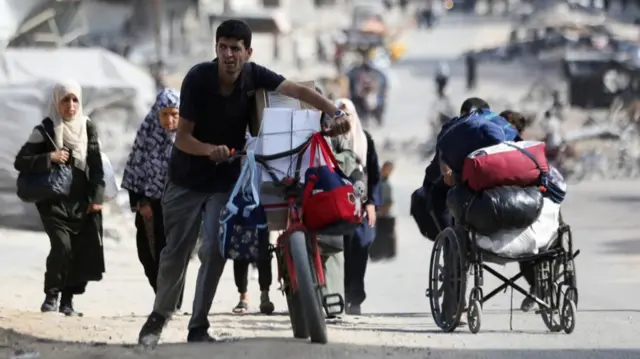 Image source, Reuters
Image source, Reuters
Displaced Palestinians flee areas in the northpublished at 12:47 British Summer Time 12 October 2024
Images show displaced Palestinians fleeing areas in the northern Gaza Strip, carrying their belongings.
Israel's military has issued evacuation orders for Jabalia and nearby areas, where the United Nations (UN) estimates more than 400,000 people are trapped.
Palestinian and UN officials say there are no safe places to flee to, external in the Gaza Strip. They have also voiced concerns over severe shortages of food, fuel, and medical supplies in northern Gaza.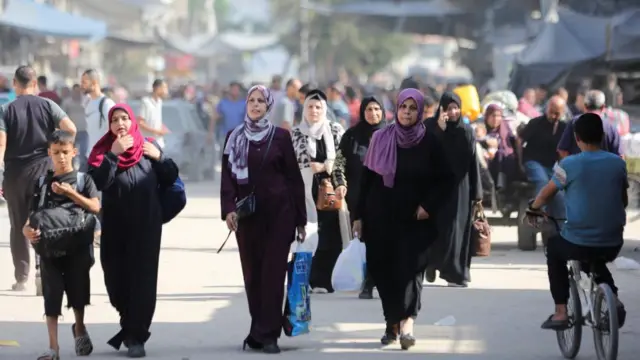 Image source, Reuters
Image source, Reuters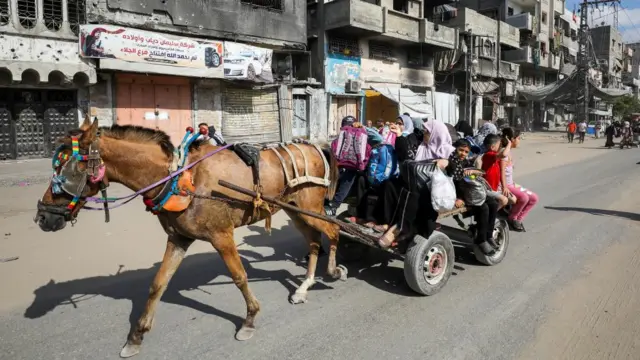 Image source, Reuters
Image source, Reuters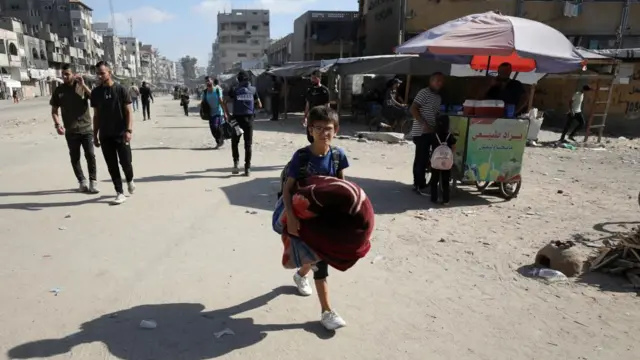 Image source, Reuters
Image source, Reuters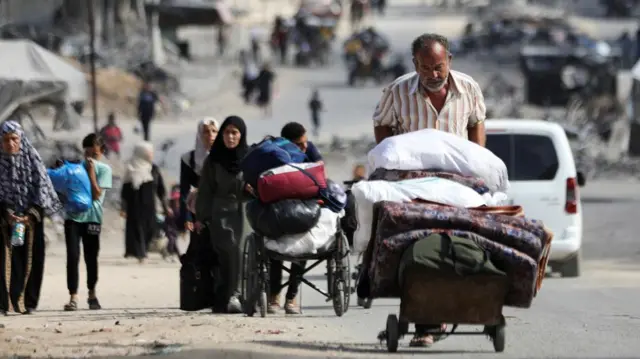 Image source, Reuters
Image source, Reuters
Egypt, Qatar foreign ministers discuss Gaza, Lebanonpublished at 12:26 British Summer Time 12 October 2024
The Egyptian foreign affairs minister has spoken to Qatar's prime minister and foreign affairs minister, according to statements from both countries.
The pair discussed the situation in the Gaza Strip and Lebanon.
This included "facilitating" the entrance of humanitarian aid to all areas of the Gaza Strip without "obstacles" and regional and international efforts to reduce escalation, one of the statements, external adds.
No food aid has entered northern Gaza in October, says UN World Food Programmepublished at 11:46 British Summer Time 12 October 2024
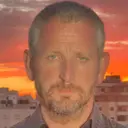 Jon Donnison
Jon Donnison
Reporting from Jerusalem
As the Israeli military continues to intensify its operation in northern Gaza, the United Nation’s World Food Programme (WFP) says the offensive is having a disastrous impact on food security for thousands of Palestinian families.
It says the main crossings into the north have been closed by Israel and no food aid has entered since 1 October.
"We are committed to delivering life-saving food every day despite the mounting challenges,” said Antoine Renard, WFP Country Director for Palestine.
“But without safe and sustained access, it is virtually impossible to reach the people in need.”
Sirens sound in Haifa Bay area in northern Israelpublished at 11:39 British Summer Time 12 October 2024
The Israel Defense Forces (IDF) says two projectiles fired from Lebanon have been intercepted by its Air Force.
It says sirens were activated in the Carmel and Haifa Bay areas.
Iranian Speaker visits bombed neighbourhood in Beirutpublished at 11:12 British Summer Time 12 October 2024
Jonathan Head
Reporting from Beirut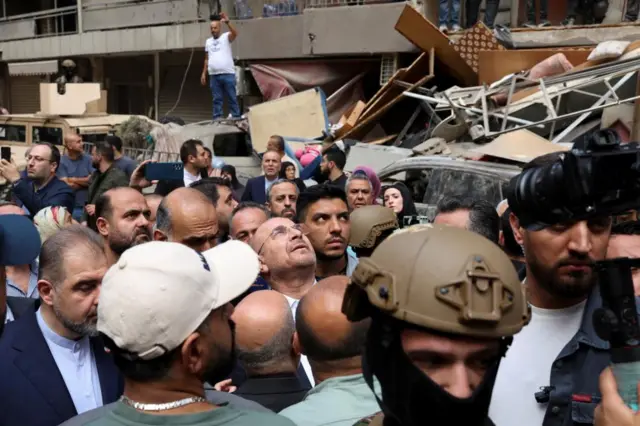 Image source, Reuters
Image source, Reuters
Image caption,
Ghalibaf, seen here looking up, visited the scene of an Israeli air strike in central Beirut
The speaker of the Iranian parliament Mohammad Bagher Ghalibaf has arrived in the Lebanese capital Beirut on a visit intended, he said, to convey a message from Iran’s supreme leader expressing solidarity with the Lebanese people, government and resistance.
Iran is the main backer of Hezbollah.
After meeting the Lebanese caretaker Prime Minister Najib Mikati he was taken by two Hezbollah MPs to Basta, one of the central Beirut neighbourhoods hit by Israeli air strikes on Thursday night, in which 22 people were killed.
While viewing the rubble, in a crush of local journalists, he said: “We support and stand in solidarity with the Lebanese people, and we will remain by their side during these difficult times."
Some Lebanese have questioned Iran’s commitment to Hezbollah after dozens of its leaders were killed in Israel’s bombing campaign in Lebanon over the past three weeks.
The Iranian Foreign Minister Abbas Araghchi also visited Lebanon last week.
Israeli forces intercept 'a number of launches' from Lebanonpublished at 11:09 British Summer Time 12 October 2024
The Israel Defense Forces (IDF) says around 30 launches, external have crossed into Israel from Lebanon and "some" were intercepted.
Earlier in a post on X, external, the IDF said it intercepted "a number of launches" that crossed into Israel from Lebanon - following alerts in the Upper Galilee in northern Israel.
Before this, the IDF said a drone crossed from Syria into Israel and fell in an open area.
Whilst two drones crossed from Lebanon. It says its Air Force intercepted one, and another caused damage to a building in Herzliya, in the Tel Aviv District.
Hezbollah warns Israelis to stay away from military sitespublished at 11:02 British Summer Time 12 October 2024
Jonathan Head
Reporting from Beirut
Hezbollah has issued a warning to Israelis to stay away from military sites in northern Israel, in order to preserve their lives.
The statement says the Israeli army placed its bases inside residential areas in the north, which it said were targets for its missiles and drones.
Hezbollah has fired daily salvoes of rockets into northern Israel.
The Israeli air strikes over the past three weeks in Lebanon are believed to have killed dozens of Hezbollah leaders, and since then, the group’s public statements have been sparse.
This warning to Israelis that they should stay away from army bases in northern cities may be intended to remind them and Hezbollah’s supporters that it still has the capacity to inflict significant damage.
It echoes Israeli accusations against Hezbollah that it conceals its fighters and weapons in civilian areas.
Hezbollah also warned that Israel had seen only a few of its strikes yet. It is not clear yet how much of their arsenal has been destroyed by recent Israeli attacks.
Hezbollah says it launched 'barrage' of rockets towards Israelpublished at 10:57 British Summer Time 12 October 2024
Hezbollah says it launched a "barrage" of rockets towards Israel, aimed at a military site to the south of Haifa in northern Israel.
It says the attack was in the early hours of the morning, at approximately 06:00 local time, according to a statement on Telegram.
There has been no specific mention of Haifa from the IDF so far this morning.
Military wing of Hamas says it attacked two Israeli tankspublished at 10:18 British Summer Time 12 October 2024
Al-Qassam Brigades, a military wing of Hamas, says it has attacked two Israeli Merkava tanks and a bulldozer in the Al Janina neighbourhood in the southern Gaza Strip, in a post on Telegram.
IDF says it continues to 'target Hezbollah positions' in southern Lebanonpublished at 09:51 British Summer Time 12 October 2024
In southern Lebanon, the Israel Defense Forces (IDF) says it continues to "target Hezbollah positions".
In a post on X, external, IDF spokesperson Avichay Adraee issues a message to residents to not return to their homes "until further notice" and that anyone travelling south could be endangering their lives.
Adraee says the IDF will inform people when it's "safe" to return.
Israeli army calls for evacuation of 'D5' area in Gaza Citypublished at 09:24 British Summer Time 12 October 2024
The Israel Defense Forces (IDF) has called on Palestinians in the "D5" area in Gaza City in the northern Gaza Strip to evacuate "immediately".
In a post on X, external, IDF spokesperson Avichay Adraee says the designated area is considered a "dangerous combat zone" and calls for an immediate evacuation via Salah al-Din Street.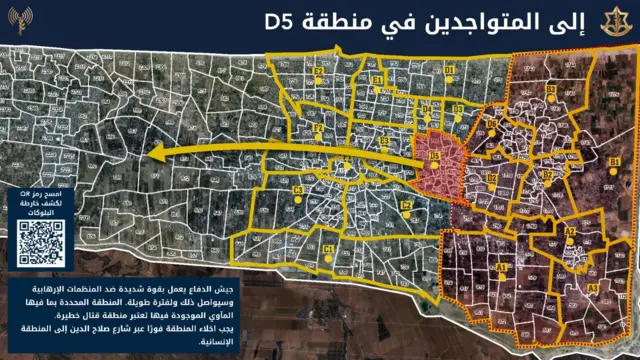 Image source, IDF spokesperson Avichay Adraee / X
Image source, IDF spokesperson Avichay Adraee / X
Gaza health ministry says 49 people killed over past 24 hourspublished at 09:12 British Summer Time 12 October 2024
Breaking
The Hamas-run Gaza health ministry says, external 49 people have been killed and 219 others injured in five Israeli attacks in the Gaza Strip over the past 24 hours.
It adds rescue operations continue, and that people are still under rubble.
The health ministry estimates that at least 42,175 people have now been killed since 7 October last year, with 98,336 others injured.
